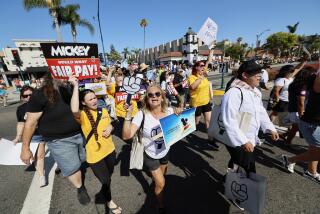Tentative Accord Reached to End DWP Strike
- Share via
The unions representing striking Los Angeles Department of Water and Power employees agreed to a tentative settlement on Thursday, putting an apparent halt to the 9-day-old walkout at the nation’s largest public utility.
The agreement, reached after marathon talks in Mayor Richard Riordan’s office, must still be approved by the union membership. But members gathered outside the DWP’s downtown headquarters jubilantly declared the end of the walkout and some pickets said they planned to put down their signs and report to their morning shifts.
The 9% pay increase over four years and other related contract provisions are similar to the offer overwhelmingly rejected by members of the International Brotherhood of Electrical Workers, Local 18, Wednesday night.
The agreement grants the members some of the retroactive pay they had sought, city negotiators said, but it comes with other budget changes so the city will pay no more overall than in the contract that was voted down.
Other contract provisions include two days’ pay for wages lost while striking and an agreement to refer to a fact finder a union request for a 2% bonus for some electrical workers.
The city also agreed to cease pressing for contempt-of-court sanctions against the 8,500-member union, but it will be up to Superior Court Judge Robert H. O’Brien to decide whether to cite the union for violating his order to temporarily call off the strike.
“While no one is entirely happy with the result, the one thing we struck for that is intangible, that means more than anything else, is our dignity,” said Brian D’Arcy, business manager for the electrical workers union.
Although the potential power outages and water shortages that officials feared may have passed, the city now faces other angry municipal employees who have worked without salary increases for more than a year. That prospect prompted four of the 13 council members involved in negotiations to vote against Thursday’s plan.
“I just don’t think this city can afford this,” said an angry Councilman Joel Wachs. “This is the kind of thing that can lead the city down the road to bankruptcy.”
Riordan, who is scheduled to present his budget plan to the council next week, said the city can afford the agreement, “but it’s going to require tight fiscal management.” He said the city will have to present the budget facts to other unions and differentiate between the city’s general fund, which pays most salaries, and the quasi-independent DWP, which pays salaries through utility rates.
“Neither side is totally satisfied, which I think shows it’s a great settlement,” Riordan said.
Most council members agreed that the strike was jeopardizing essential city services and needed to be settled immediately. They said the contract went further than they would have liked, but not as far as the union sought.
“This is a fair resolution to a very difficult and contentious issue,” said Councilman Zev Yaroslavsky, the council’s budget watchdog.
The strike stretched far longer than either side anticipated and required managers and the relatively few employees who crossed picket lines to replace striking workers in the field. Routine power outages and water main breaks took much longer to repair during the strike, although DWP officials said they were extremely fortunate that the system held up so well.
The strike never hit home for the vast majority of the city’s residents, although there were some effects. One resident, Sara Guyan, went for nine days without power because she moved into her San Pedro duplex on Sept. 1, the day the strike broke out.
“All you can do is sleep, read by candlelight and clean the house,” she said. “It’s hell.”
The DWP said it had a backlog of several hundred requests for turning on power that it could not immediately respond to.
Credit for the breakthrough centered on a core group of council members, Riordan and top union leaders. After the union membership turned down Wednesday’s offer, Riordan gathered the parties in his office Thursday afternoon, where they remained until the agreement was reached late in the day.
Council members Richard Alatorre, Jackie Goldberg, John Ferraro and Yaroslavsky were said to be the key elected officials involved in the final deal.
“This was a team effort,” said Goldberg, who chairs the city’s Personnel Committee. “There was no one person that could have made this happen--on either side.”
The second union in the walkout, the Engineers & Architects Assn., was not included in most of the talks, but its 2,500 members will receive the same agreement that Local 18 negotiated, city and union officials said.
The electrical workers’ negotiating team accepted the city’s offer by a 23-2 vote, D’Arcy said. The union will mail the offer to the membership in the coming days for a formal vote.
On the council, Wachs joined Rita Walters, Rudy Svorinich Jr. and Marvin Braude in voting against the plan, which must come back before the council for a final vote.
Union leaders did not announce details of the plan to members Thursday night, waiting for the written announcements. D’Arcy said only that the plan “includes significant wage bonuses and job security,” that prohibits employees from being laid off in order to hire outside contractors.
During his campaign, Riordan pushed for more privatization in city government, but he pledged that he will do so without laying off employees.
Even without all the details, union members said they trusted their leadership and considered the strike over.
“It’s great to be back to work,” said Jack Samara, a structural engineering associate as he celebrated the tentative settlement. “It was rough being our there on the sidewalk in the hot sun all day. And it was rough not getting a paycheck.”
More to Read
Sign up for Essential California
The most important California stories and recommendations in your inbox every morning.
You may occasionally receive promotional content from the Los Angeles Times.










